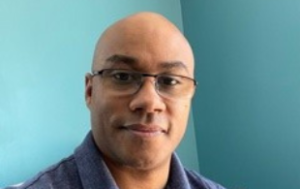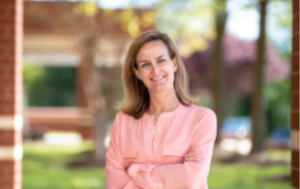Kenneth Childs III of Hazelwood Elementary/Middle School and Lynn Rashid of Marriotts Ridge High School were named this year’s Maryland History Statewide Day Middle and High School Teacher of the Year, respectively. Maryland History Day also nominates these teachers for the Patricia Behring Teacher of the Year Award, facilitated by National History Day: results will be announced at the National History Day awards ceremony this weekend. Childs and Rashid discuss the Maryland History Day program.
When discussing history education, Maryland History Day 2021 Teachers of the Year Kenneth Childs III and Lynn Rashid both talk about the joy of witnessing student discovery, whether it’s preconceived notions about a subject or the topic of history itself.

“I love changing their thinking on how history should be approached,” says Childs, who teaches at Hazelwood Elementary/Middle School in Baltimore City. “History is not a series of events that happened in a vacuum. I love when students learn that they’re actually in charge of the narratives in history.”
Lynn Rashid serves as the Media Specialist at Marriotts Ridge High School in Howard County. “I love watching [students] uncover something unexpected. Often, we encounter a topic or event from a brief reference source or documentary and walk away with understandings that can be superficial,” she says. “When a student uncovers something that challenges their understandings or assumptions, I love hearing about how that information has changed their mind or the course of their research.”
Students participating in Maryland Humanities’ Maryland History Day program create original documentary films, exhibits, performances, research papers, or websites exploring a historical topic of their choice. The program encourages critical thinking and helps develop skills in research and analysis, writing, and public speaking.
Annually, Maryland History Day at Maryland Humanities selects a Middle and High School Teacher of the Year statewide. The organization also nominates these teachers for the Patricia Behring Teacher of the Year Award, facilitated by National History Day. A committee of teachers and historians selects one middle school teacher and one high school teacher for the $10,000 national award: National History Day announces the winner at the virtual National History Day Awards Ceremony this weekend.
“Honestly, I feel so honored to just be nominated. It means so much to be recognized and honored for the award, especially with this current year,” Childs says. “Students learn to analyze and produce critical thinking skills. I…am getting middle school-aged students to engage in a high-quality level of research that some college freshmen hadn’t done before.”
For Rashid, the recognition takes on another meaning as Media Specialist: she teaches the research skills and evaluates the students’ work at every stage. “The recognition is significant because it highlights what can be achieved with collaboration between classroom teachers and media specialists,” she says. For five months, students meet with Rashid monthly for 3-4 days. “The dedication and support provided to the students throughout this five-month process is extraordinary and being selected for the award is an opportunity to honor the hard work of each of the staff members and students that I have the privilege of working with.” 
Rashid, who has been involved with Maryland History Day for about twenty years, feels as if the program can benefit students no matter what they pursue later in life. “I think Maryland History Day a great opportunity for students to learn research skills that will not only help them in their academic lives but in their personal lives,” she says. “For any information need or inquiry, people need to consult multiple sources, then evaluate those sources to make an informed decision. Whether the students go to college or not, this kind of inquiry process is important for learning new things and producing well-founded arguments.”
Childs appreciate the amount of agency students have in the program. “It presents students with the opportunities to control their learning experience and offers a series of ways to deliver the information that they learned,” he says. “Students are allowed to find their own interests and do a deep dive into the history of it.” Rashid agrees: “The information they learn is shared in a way that creates meaning and understanding not only of our shared past but sheds light on our future potential,” she says. “I have seen students who are turned off by research become engaged in the process because they are researching a topic that has personal meaning to them.”
One of Rashid’s students, Nadia Ghaicepour, received the Award in Civic Engagement and Action (sponsored by Maryland Council for Social Studies) for her documentary on journalist and photographer Jacob Riis.
“I was very excited for her! Nadia worked on this project in addition to her four academic classes,” Rashid says. “She took the initiative to research this topic outside of her social studies course and she worked hard to create something that I think is not just an analysis of the past but a lens with which to look forward as we tackle our current societal issues.“
Both teachers have witnessed the impact of Maryland History Day participation on students’ self-esteem. “I have seen students who don’t see themselves as stand out students develop the confidence to try new classes and join new activities such as theater, as a result of completing and competing with their final projects,” Rashid says as she recalls one “one shy, quiet student” who created a performance. “We were blown away by his work and referred him to our theater teacher. His performance as the lead in Macbeth is one we still talk about at MRHS.” Childs also talks of how Maryland History Day has encouraged some students to be more willing to speak in public, especially if they pursue the program for more than one year.
Rashid talks about the change in history education in the past few decades. “The program encourages the students to create their own meaning and understanding based on the information they uncover. History instruction in the last 20 years has really moved in this direction,” she says. “Students are provided with documents, photos and other artifacts from the time period and asked to analyze them and draw conclusions.”
This differs from Childs’ own experiences with history education. “In school, I was taught facts. Even though I was good at remembering facts, I was never encouraged to immerse myself in the history,” he says. “History had no ramifications on my present-day world. I was not instructed to teach it any kind of way. I was lucky enough to be able to teach history how I always thought I wanted it to be taught to me.”
Learn more about Maryland History Day. Disclaimer: The views and opinions expressed on our blog do not necessarily reflect the views or position of Maryland Humanities or our funders.

